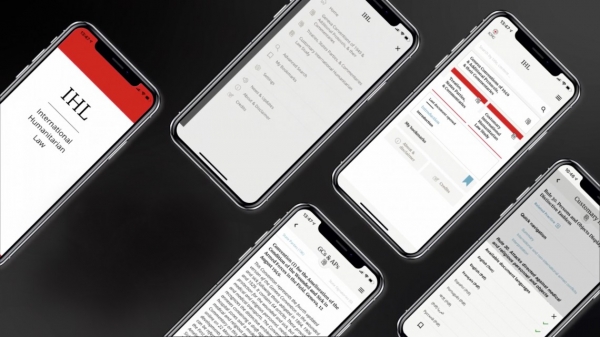The Law in Your Pocket
Specifically designed to allow easy, practical and instant consultation of the law: here is the new App created by the International Committee of the Red Cross (ICRC), an entire manual of international humanitarian law, totally digitalized and always at hand.
Once the App has been downloaded, users will get unlimited access to over 75 treaties and documents, including the Four Geneva Conventions, the Two Additional Protocols and related Commentaries. They can consult the texts in 6 languages and can save and share copies anywhere and at any time.
The idea deserves to be saluted with great enthusiasm. And not only by those who find themselves having to work every day on the battlefield or in situations of conflict, but also by all those who are supporters and promoters of the ambition that is at the basis of the law: the dissemination of knowledge as a way to ensure compliance (for more information on this topic, read: the Dissemination of International Humanitarian Law).
To know more, please read:
https://www.icrc.org/en/document/ihl-digital-app?utm_campaign=DP_Forum%20-%20newsletter%20no.88&utm_source=hs_email&utm_medium=email&utm_content=76423121&_hsenc=p2ANqtz-_8DhRNrQQdYH2idKxm23ot2jwCR-vbpVBZIB5aPZxHM3fcRGodCdSIZ9xqrZGTPNO6lQVoiQcX3SsRQQG2qMJr9f7IBg&_hsmi=76423121
Negotiation: a precarious balance between principle and reality
Through an interactive-narrative test, designed to personally evaluate our ability to deal with the counterpart, the International Committee of the Red Cross (ICRC) confronts us with some of the countless dilemmas that revolve around the area of negotiation in the areas of conflict.
Critical choices are often the result of long balancing operations between morality and law, principle and reality. As highlighted by the ICRC, if negotiations fail, people may not receive the assistance and protection they so urgently need.
In light of this, and in order to better prepare its delegates, the ICRC wanted to join forces and put together many of the experiences brought by members of Doctors Without Borders (MSF), the UNHCR, the World Food Program and the Center for Humanitarian Dialogue (HD). Based on this collection, the Humanitarian Negotiation Competence Center (CCHN) conducted an in-depth analysis of the main negotiation techniques and strategies used by these experts every day on the field. The outcome of this study was included in the manual entitled CCHN Field Manual on Frontline Humanitarian Negotiation, which was published last December 2018.
To read more, please visit:
https://www.icrc.org/en/frontline-negotiation
Cluster Munitions, still an actual threat
From 2 to 4 September 2019, the Ninth Meeting of State Parties to the Convention on the Prohibition of Cluster Bombs (CCM) was held in Geneva, at the Palais des Nations. The CCM is the international treaty of more than 100 States that addresses the humanitarian consequences and unacceptable harm caused to civilians by cluster munitions, through a categorical prohibition and a framework for action.
Since its entry into force in 2010, the Convention has manifested an incredible adhesion (more than 100 States are party to it, as well as a remarkable success in terms of observance.
Nevertheless, as reiterated by Gilles Carbonnier, Vice-President of the ICRC, unexploded bombs still constitute a serious and constant threat, as they keep on killing in many parts of the world. The event therefore constituted the occasion to reiterate once again the responsibility of all States in the continuous respect and observance of the norms of the Convention, as well as the mutual commitment in spreading the principles and promoting their adherence.
To read more, please visit:




